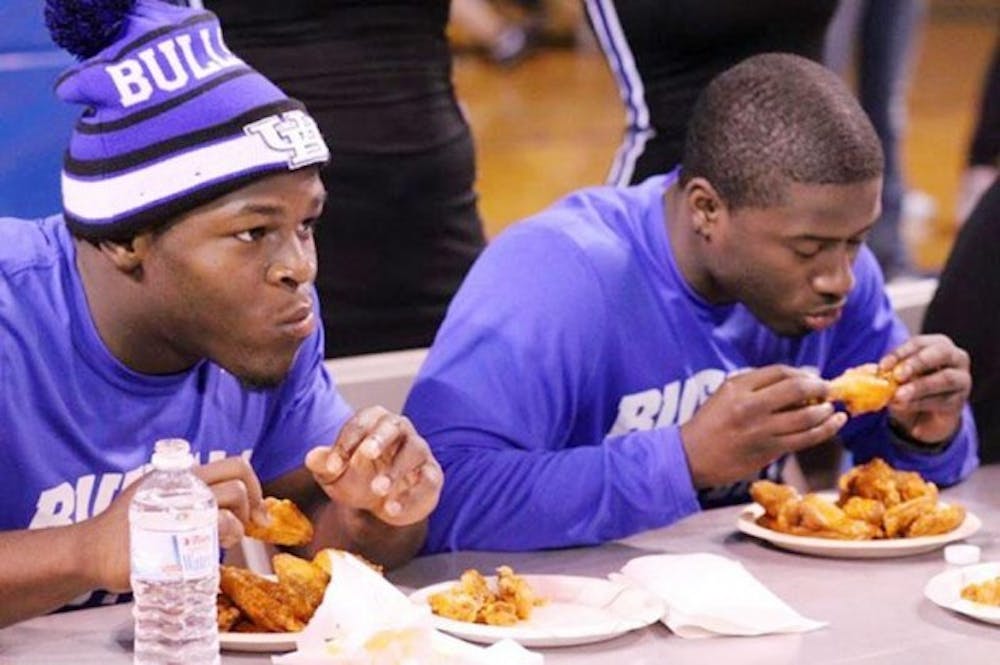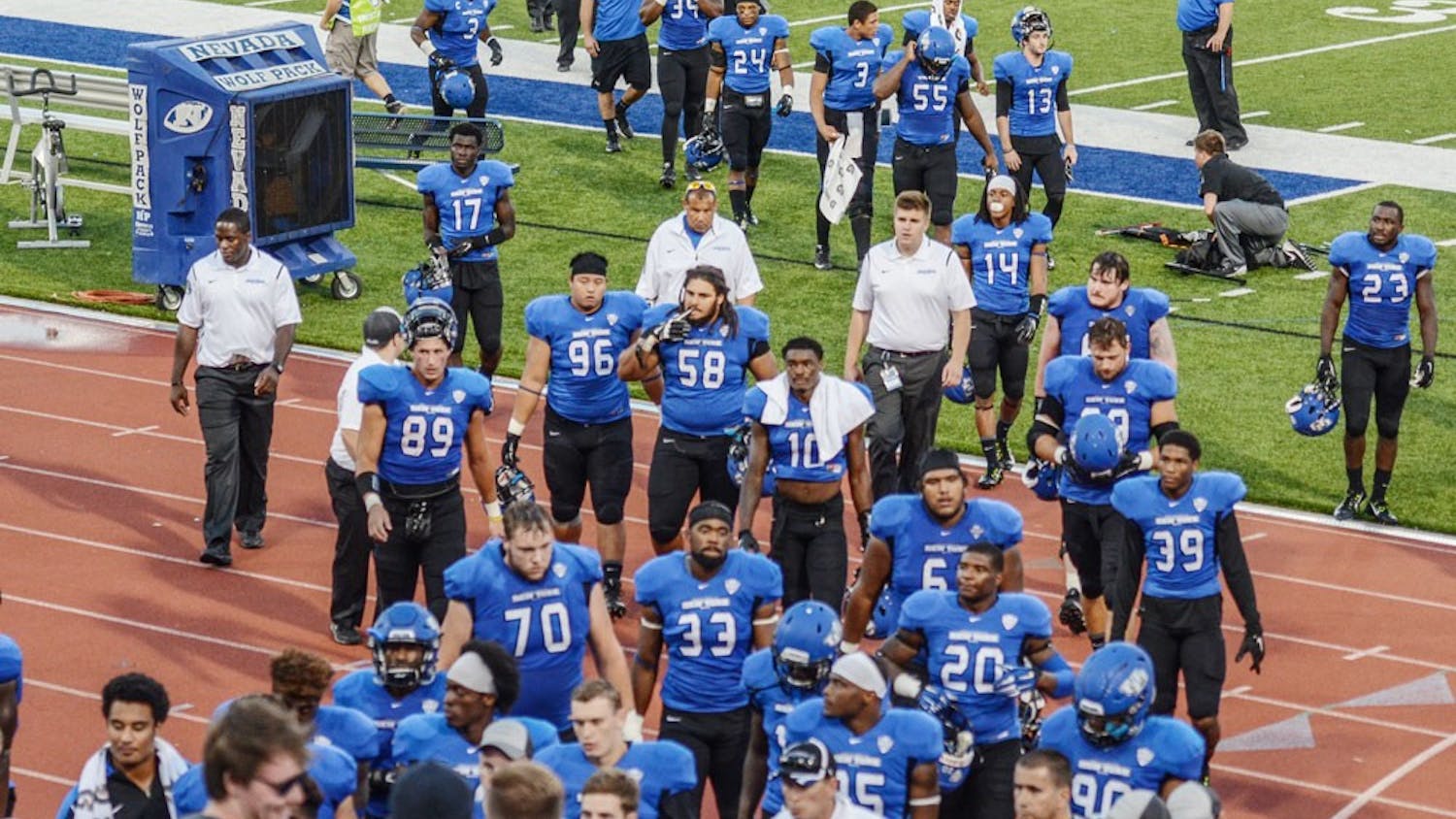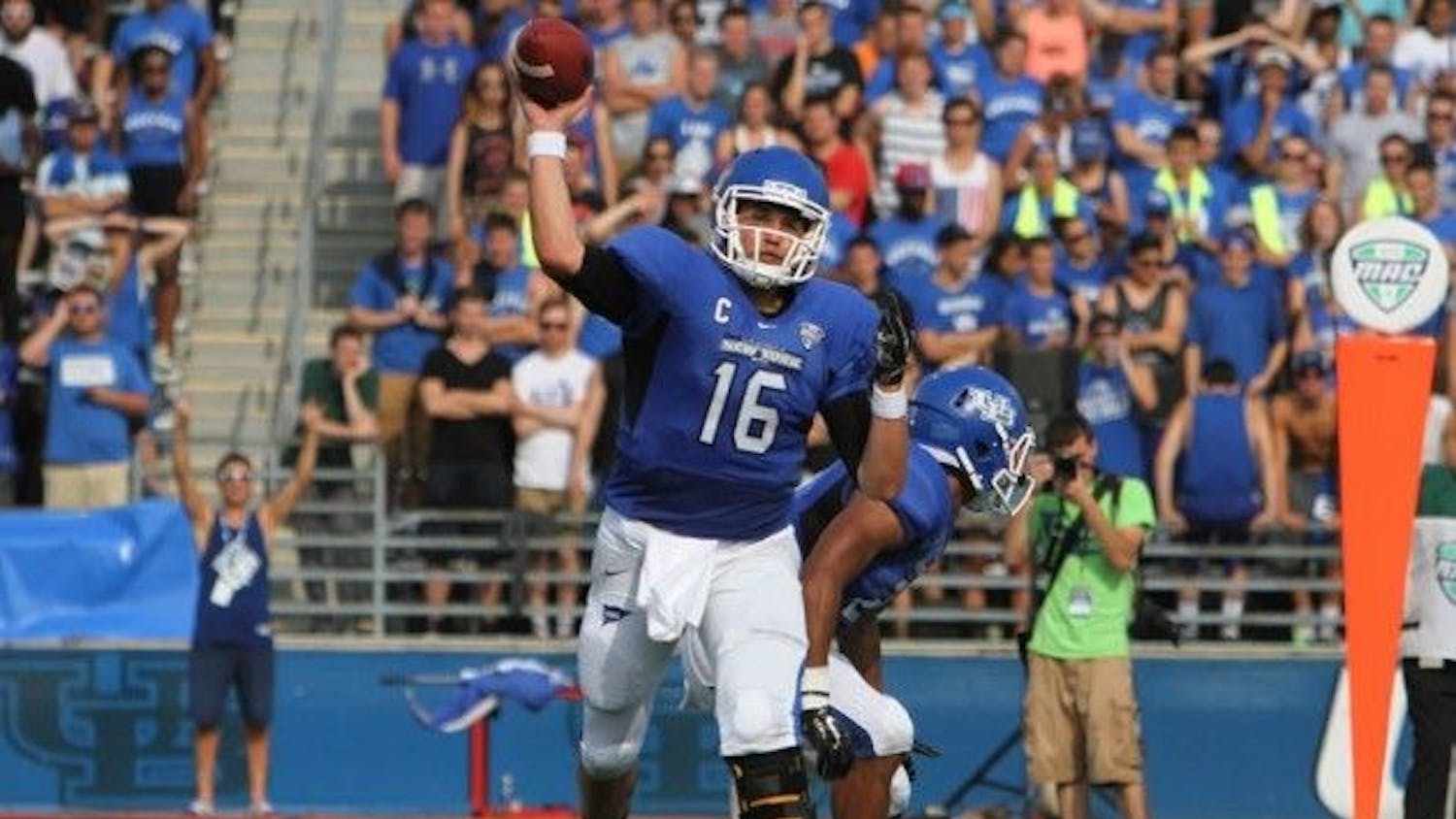In 1970, there was one player in the NFL over 300 pounds. Today, there are 360 linemen well over that benchmark. Being an offensive or defensive lineman is one of the few jobs in the world where a 300-pound man could be considered undersized.
This trend has also spread to the collegiate ranks, which leaves university athletic programs with the task of feeding young men who eat far more than the average human. And the Bulls' offensive line is no exception.
At 326 pounds, senior Jasen Carlson was the largest lineman for the football team in 2013.
"We budget for [food] as we would for team socks, hats and shoes," said Deputy Director of Athletics Allen Greene.
Collegiate level offensive linemen eat roughly 4,000 to 6,000 calories a day, according to ESPN. A rigorous and often overwhelming diet must be implemented for these student-athletes in order to maintain ideal physicality.
"The university has a nutritionist that we use as a resource," Greene said. "We as the department do not employ a nutritionist for the athletics department, and it is the student's responsibility to pursue the nutritionist's services."
Carlson and senior wide receiver Fred Lee said they have no knowledge of these resources.
"I think the school should invest in a nutritionist for every sports team," Lee said.
Greene is responsible for the day-to-day operations of the department - approval for travel, budget expenses and keeping the university's athletic facilities up to date. The department designates an operations budget for each sport at UB, which is constructed and implemented at the beginning of every semester, to designate spending for food costs and travel expenses.
Every sport is provided funds for student athletic scholarships as part of its operations budget. Scholarships include a stipend of sorts for each player to spend on food and nutritional supplements.
Buddy Morris, the football team's strength and conditioning coach, and Paul Bittar, the director of football operations, provide the football players with diet and exercise regimes.
The player is ultimately in control of how he decides to spend his stipend, which is equivalent to the "Any 19" meal plan - which provides students with 19 meals to use from Saturday to Friday. This stipend is relayed to student athletes via a personal direct deposit account and consists of three separate payment periods per semester.
Although the exact number changes every year due to changes in the meal plan costs, each payment ranges between $1,800 and $1,900. If the student decides to live off campus, then a combined figure will be included in the stipend to cover living expenses, which are equivalent to a double sized dorm room. In order to qualify for this option, the student athlete must show proof of residency, as well as access to a vehicle.
Buddy Morris will be faced with the task of evaluating and improving the skills and physical fitness of the entire UB football team. At the beginning of the season, Morris will conduct body mass index exams and strength and conditioning tests on each player to determine their level of physicality. Each player will receive a yellow, green or red card at the end of the assessment. A yellow card indicates ideal weight, green card indicates that the player needs to gain weight, and a red card means the player needs to lose weight. Diet and nutrition suggestions are distributed to each player along with their color indicated card encouraging players to eat these particular foods in order to maintain or adjust their weight.
Every player is encouraged to conduct a different diet regime depending on his position and target fitness level. An offensive lineman, for example, will usually be encouraged to eat as much as possible to maintain or gain a high body weight.
"I try to eat roughly 4,000 calories a day," Carlson said. "We all work out several hours a day, so it is important to replace those calories lost through exercising."
A wide receiver needs to adjust his diet in order to achieve elite endurance, stamina and a low body mass index. Lee has had four years to perfect his diet into a precise science.
"Eliminating carbs while balancing a high level of protein is ideal, but will also trick your body into feeling hungry when you've actually had enough to eat," Lee said. "Twenty six days is all it takes to break a bad habit. Your body will adjust after this time to ignore the feeling of hunger when reducing the intake of carbohydrates."
Lee has been advising his teammates about his diet and how to achieve optimal levels of fitness. He believes in a balanced diet of proteins and all natural foods. Lee also believes that committing to healthy eating involves a great deal of mental toughness and stability.
"Your senses can confuse your body and make you think you're hungry when really your body just needs water," Lee said. "It's like when you cried as a baby and your mother would give you milk. That tricks the mind at a young age into believing you're hungry when you're actually just thirsty."
The operations budget funds meals for road games, which usually includes whole-wheat subs from Subway with meat, vegetables and no condiments.
The budget also endorses a team breakfast, lunch, dinner and post-game meals for the players who travel with the team. Because UB has a contractual agreement with Pepsi, every sports team will also use the operations budget to supply the players with Pepsi products, including Gatorade and Aquafina.
"It is essential for student-athletes to refuel and replenish their electrolytes," Greene said. "All athletics [teams] have fruits and nuts available to snack on as part of the operations budget."
Each program also has a development account, which is essentially composed of fundraised and donated money.
"Our programs encourage community members to donate their food services as what we refer to as a 'gift in kind' donation," Greene said.
He said that means local eateries will sometimes provide food for the athletes without an exchange of money or advertising.
The development account will provide "occasional meals," which can include team-bonding activities like having a pizza party at the coach's house. These "occasional meals" are also provided by donations and fundraisers.
The task of feeding just a few 300-pound men can be daunting - supplying an entire athletics program with food is a much bigger undertaking. Greene said coaches and the athletic department's administration at UB collaborate to ensure that student-athletes are given all the resources needed to stay in prime shape.
"At the end of the day, you want to eat what looks the most natural," Lee said.
email: sports@ubspectrum.com





